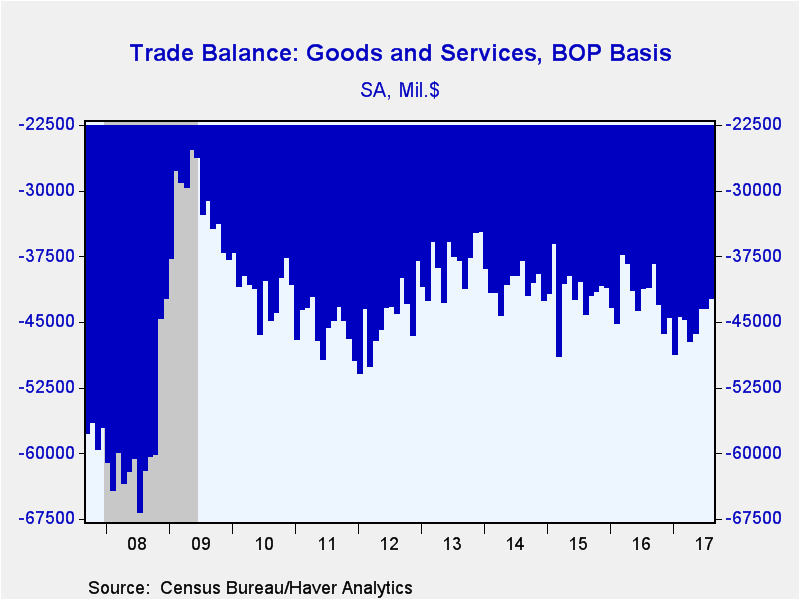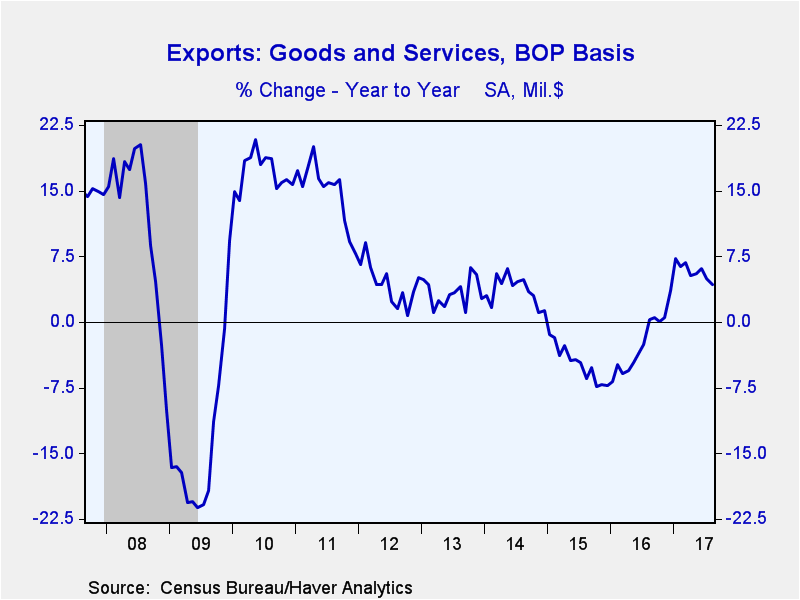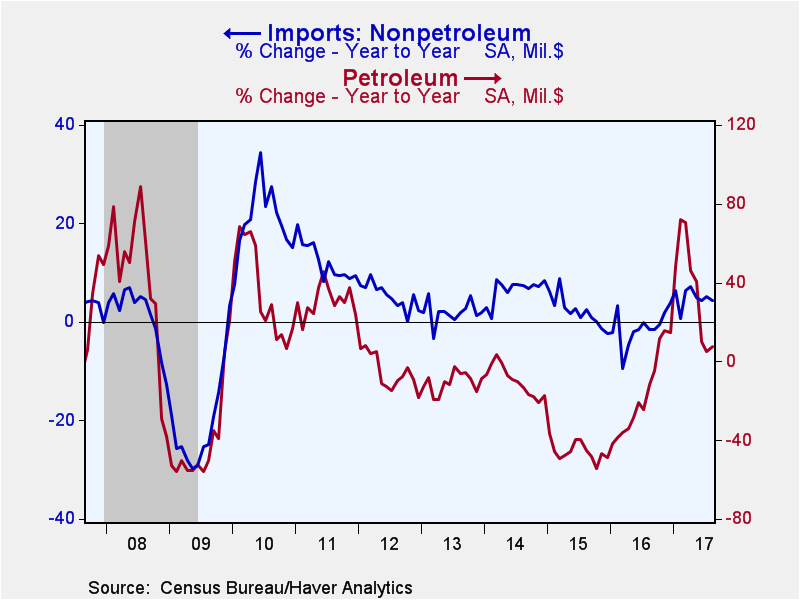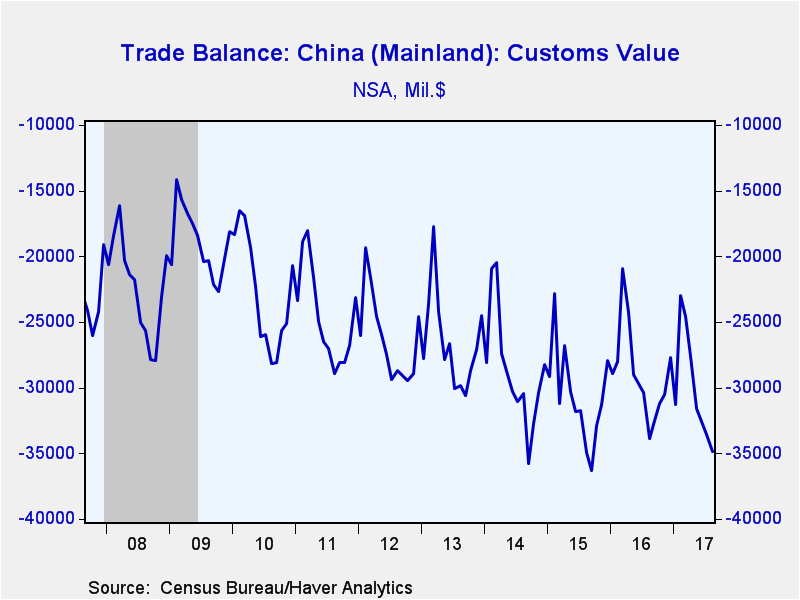 Global| Oct 05 2017
Global| Oct 05 2017U.S. Trade Deficit Eases; Exports Improve as Imports Slip
by:Tom Moeller
|in:Economy in Brief
Summary
The U.S. trade deficit in goods and services fell to $42.4 billion during August from $43.6 billion during July which was little revised. A $42.8 billion deficit had been expected in the Action Economics Forecast Survey. Total exports [...]
The U.S. trade deficit in goods and services fell to $42.4 billion during August from $43.6 billion during July which was little revised. A $42.8 billion deficit had been expected in the Action Economics Forecast Survey. Total exports increased 0.4% (4.2% y/y) after a 0.2% July dip. Imports eased 0.1% (+4.0% y/y), the fourth consecutive month of slight decline.
The increase in exports reflected a 0.1% uptick (4.2% y/y) in exports of goods which followed a 0.3% decline. Auto exports rose 0.5% (0.9% y/y) after a 4.4% decline. Nonauto consumer goods exports recovered 6.4% (-3.7% y/y) after declining 4.1%. Foods, feeds & beverage exports fell 3.4% (-11.4% y/y) and reversed July's increase. Capital goods exports improved 0.9% (7.0% y/y), up for the third straight month. Exports of industrial supplies & materials were off 2.5% (+7.4% y/y) following a 0.3% slip.
Services exports increased 0.4% (4.4% y/y) following little change. Charges for the use of intellectual property fell 0.5% (-5.3% y/y), down for the third straight month. Travel exports increased 0.6% (5.7% y/y), up for the fourth month in five. Transport exports declined 2.3% (+0.2% y/y) following a 0.4% increase.
Imports' slip reflected a 0.2% drop (+4.6% y/y) in goods imports, the fourth straight month of slight decline. Industrial supplies & materials imports fell 1.3% (+5.2% y/y), the fifth decline in six months. Auto imports increased 2.3% (4.0% y/y) and reversed July's decline. Nonauto consumer goods imports ticked 0.2% higher (1.7% y/y) following stability during the prior month. Capital goods imports fell 0.9% (+7.5% y/y) following a 2.4% increase. Foods, feeds & beverage imports declined 0.7% (+6.4% y/y) following two months of moderate increase.
Nonpetroleum goods imports declined 0.6% (+4.4% y/y) after a 0.3% rise. Petroleum imports strengthened 4.9% (7.6% y/y) with higher prices. The cost of crude petroleum rose 2.1% (12.0% y/y) to $44.11 per barrel, but prices have been little changed since December.
Services imports slipped 0.1% (+2.0% y/y) and have been fairly stable for three months. Charges for the use of intellectual property rose 1.2% (-15.0% y/y) for the second straight month. Travel imports increased 0.7% (7.4% y/y) and reversed two months of decline. Transport imports fell 2.6% (+2.4% y/y) following a 0.4% rise.
By country, the trade deficit with China deepened to $34.9 billion from $33.9 billion one year earlier. Exports strengthened 16.6% y/y while imports rose 6.0% y/y. The trade deficit with Japan increased to $6.6 billion from $6.0 billion twelve months earlier. Exports to Japan fell 1.0% y/y while imports gained 4.6% y/y. The trade deficit with the European Union eased to $12.4 billion from $13.9 billion one year earlier. Exports to the EU eased 7.0% y/y while imports were unchanged y/y. These country data are not seasonally adjusted.
The international trade data can be found in Haver's USECON database. Detailed figures are available in the USINT database. The expectations figures are from the Action Economics Forecast Survey, which is carried in AS1REPNA.
| Foreign Trade in Goods & Services (Current Dollars) | Aug | Jul | Jun | Y/Y | 2016 | 2015 | 2014 |
|---|---|---|---|---|---|---|---|
| U.S. Trade Deficit | $42.4 bil. | $43.6 bil. | $43.5 bil. | $41.1 bil. (8/16) |
$504.8 bil. | $500.4 bil. | $490.3 bil. |
| Exports of Goods & Services (% Chg) | 0.4 | -0.2 | 1.4 | 4.2 | -2.5 | -4.7 | 3.6 |
| Imports of Goods & Services (% Chg) | -0.1 | -0.2 | -0.1 | 4.0 | -1.9 | -3.6 | 4.0 |
| Petroleum (% Chg) | 4.9 | -7.1 | -9.6 | 7.6 | -19.4 | -45.5 | -9.7 |
| Nonpetroleum Goods (% Chg) | -0.6 | 0.3 | 0.7 | 4.4 | -1.2 | 2.2 | 6.5 |
Tom Moeller
AuthorMore in Author Profile »Prior to joining Haver Analytics in 2000, Mr. Moeller worked as the Economist at Chancellor Capital Management from 1985 to 1999. There, he developed comprehensive economic forecasts and interpreted economic data for equity and fixed income portfolio managers. Also at Chancellor, Mr. Moeller worked as an equity analyst and was responsible for researching and rating companies in the economically sensitive automobile and housing industries for investment in Chancellor’s equity portfolio. Prior to joining Chancellor, Mr. Moeller was an Economist at Citibank from 1979 to 1984. He also analyzed pricing behavior in the metals industry for the Council on Wage and Price Stability in Washington, D.C. In 1999, Mr. Moeller received the award for most accurate forecast from the Forecasters' Club of New York. From 1990 to 1992 he was President of the New York Association for Business Economists. Mr. Moeller earned an M.B.A. in Finance from Fordham University, where he graduated in 1987. He holds a Bachelor of Arts in Economics from George Washington University.
More Economy in Brief
 Global| Feb 05 2026
Global| Feb 05 2026Charts of the Week: Balanced Policy, Resilient Data and AI Narratives
by:Andrew Cates










